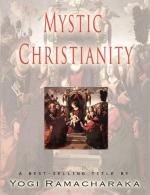St. Clement of Alexandria has said regarding the above saying of Jesus:
“Even now I fear, as it is said, ’to cast the pearls before swine, lest they tread them underfoot, and turn and rend us.’ For it is difficult to exhibit the really pure and transparent words respecting the true Light to swinish and untrained hearers.”
In the first century after Christ, the term “The Mysteries of Jesus” was frequently used by the Christian teachers, and the Inner Circle of Christians was recognized as a body of advanced souls who had developed so far as to be able to comprehend these mysteries.
The following passage from St. Mark (4:10-12) is interesting in this connection:
“And when He was alone, they that were about Him with the twelve asked of Him the parables. And He said unto them, ’Unto you is given the mystery of the kingdom of God: but unto them that are without, all things are done in parables: that seeing they may see, and not perceive; and hearing they may hear, and not understand.’”
The same writer says (4:33-34):
“And with many such parables spake He the word unto them, as they were able to hear it; and without a parable spake He not unto them; but privately to His own disciples He expounded all things.”
Jesus said to His disciples (John 16:12.): “I have yet many things to say to you, but ye cannot bear them now.” The Occult Teachings state that when He returned in His astral form, after the crucifixion, He taught them many important and advanced mystic truths, “speaking of the things pertaining to the kingdom of God.” (Acts 1:3.)
The early Christian Fathers spake and wrote openly regarding the Christian Mysteries, as all students of Church History well know. Polycarp, Bishop of Smyrna, writes to certain others hoping that they are “well versed in the sacred Scriptures and that nothing is hidden from you; but to me this privilege is not yet granted.” (The Epistle of Polycarp, chapter 7.) Ignatius, Bishop of Antioch, says that he is “not yet perfect in Jesus Christ. For I now begin to be a disciple, and I speak to you as my fellow disciple.” He also addresses them as being “initiated into the Mysteries of the Gospel, with St. Paul, the holy, the martyred.” Again:
“Might I not write to you things more full of mystery? But I fear to do so, lest I should inflict injury on you who are but babes. Pardon me in this respect, lest, as not being able to receive their weighty import, ye should be strangled by them. For even I, though I am bound and am able to understand heavenly things, the angelic orders, and the different sorts of angels and hosts, the distinction between powers and dominions, and the diversities between thrones and authorities, the mightiness of the aeons, and the preeminence of the cherubim and seraphim, the sublimity of the Spirit, the kingdom




